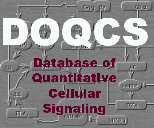
|
Enter a Search String | | Special character and space not allowed in the query term.
Search string should be at least 2 characters long. |
Molecule Parameter List for CaMKII | The statistics table lists the distribution of a molecule acting either as a substrate, product, enzyme or as a molecule within the network.
The text color of a molecule is highlighted by  color. color. | | Statistics |
Accession and Pathway Details | |
| Accession Name | Accession No. | Accession Type | Pathway Link | | CaMKII_model3 | 63 | Network |
Shared_Object_CaMKII_model3, CaMKII, CaM,
PP1, PP2B, PP1_PSD,
AC, PKA | | This is the complete model of CaMKII bistability, model 3. It exhibits bistability in CaMKII activation due to autophosphorylation at the PSD and local saturation of PP1. This version of model 3 includes PKA regulatory input. This has little effect on the deterministic calculations, but the PKA pathway introduces a lot of noise which causes a difference in stochastic runs. |
CaMKII acting as a Molecule in CaMKII_model3 Network
| Name | Accession Name | Pathway Name | Initial Conc.
(uM) | Volume
(fL) | Buffered | | CaMKII | CaMKII_model3
Accession No. : 63 | CaMKII
Pathway No. : 264 | 20 | 0.09 | No | | Huge conc of CaMKII. In PSD it is 20-40% of protein, so we assume it is around 2.5% of protein in spine as a whole. This level is so high it is unlikely to matter much if we are off a bit. |
CaMKII acting as a Summed Molecule in CaMKII_model3 Network
CaMKII acting as a Product of an Enzyme in CaMKII_model3 Network
CaMKII acting as a Substrate in a reaction in CaMKII_model3 Network
| Kd is calculated only for second order reactions, like nA+nB <->nC or nA<->nC+nD, where n is number and A,B,C,D are molecules, where as for first order reactions Keq is calculated.
Kd for higher order reaction are not consider. |
| Name | Accession Name | Pathway Name | Kf | Kb | Kd | tau | Reagents | | CaMKII-bind-CaM | CaMKII_model3
Accession No. : 63 | CaMKII
Pathway No. : 264 | 49.9997
(uM^-1 s^-1) | 5
(s^-1) | Kd(bf) = 0.1(uM) | - | Substrate
CaM-Ca4
CaMKII
Product
CaMKII-CaM
| | This is tricky. There is some cooperativity here arising from interactions between the subunits of the CAMKII holoenzyme. However, the stoichiometry is 1. Kb/Kf = 6e4 #/cell. Rate is fast (see Hanson et al Neuron 12 943-956 1994) so lets say kb = 10. This gives kf = 1.6667e-4 H&S AnnRev Biochem 92 give tau for dissoc as 0.2 sec at low Ca, 0.4 at high. Low Ca = 100 nM = physiol. |
CaMKII acting as a Product in a reaction in CaMKII_model3 Network
| Kd is calculated only for second order reactions, like nA+nB <->nC or nA<->nC+nD, where n is number and A,B,C,D are molecules, where as for first order reactions Keq is calculated.
Kd for higher order reaction are not consider. |
| Name | Accession Name | Pathway Name | Kf | Kb | Kd | tau | Reagents | | back_1 | CaMKII_model3
Accession No. : 63 | Shared_Object_
CaMKII_model3
Pathway No. : 263 | 0.3
(s^-1) | 0
(#^-1 s^-1) | Not applicable** | - | Substrate
CaMKII-PSD
Product
CaMKII
NMDAR
| | Rates set by the translocation experiments of Shen and Meyer, Science 1999. |
** This is a trasport reation between compartments of different volumes. Therefore Kd is not applicable. Please Note Kf, Kb units are in number of molecules instead of concentration
| Database compilation and code copyright (C) 2022, Upinder S. Bhalla and NCBS/TIFR
This Copyright is applied to ensure that the contents of this database remain freely available. Please see FAQ for details. |
|
